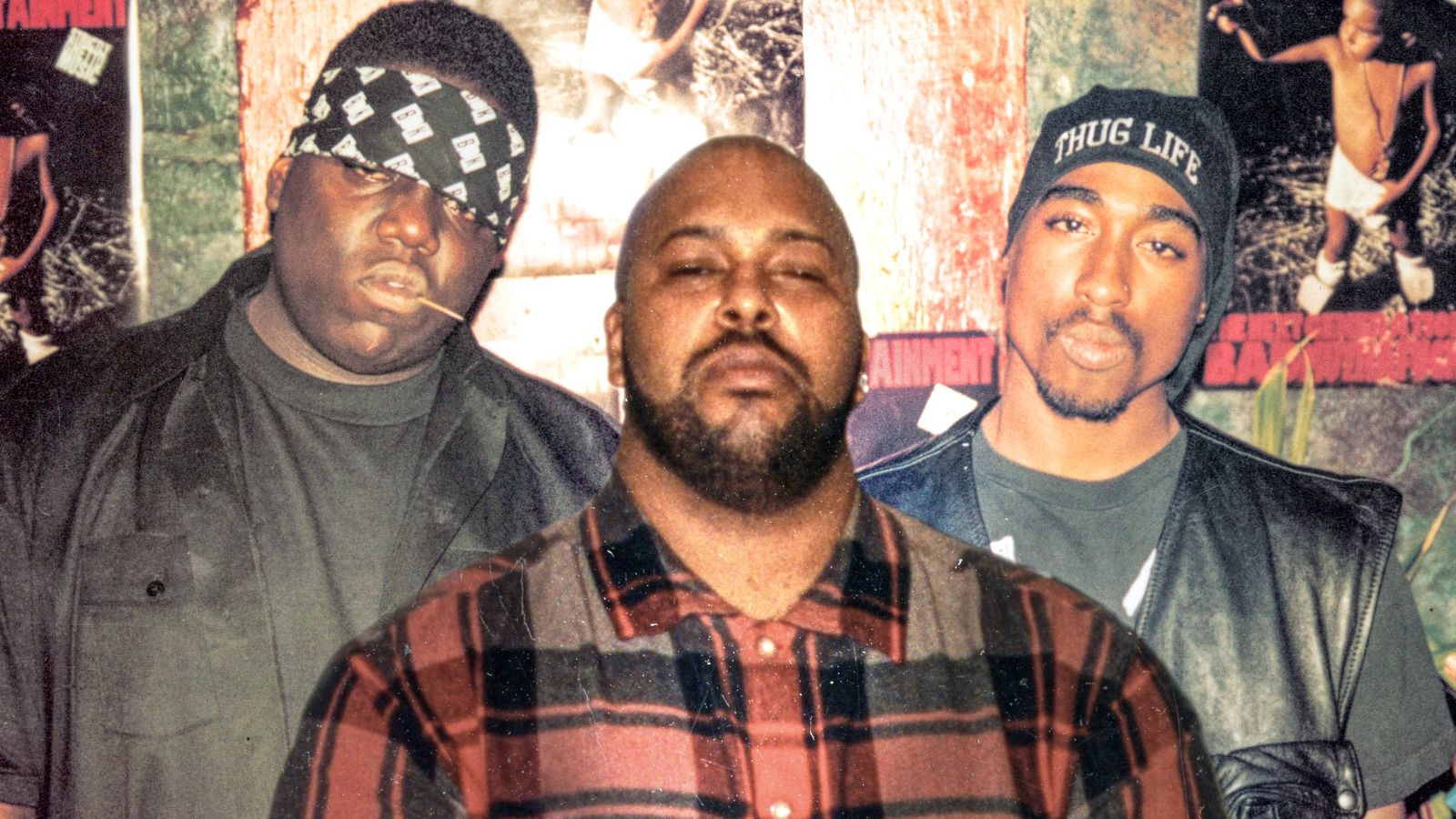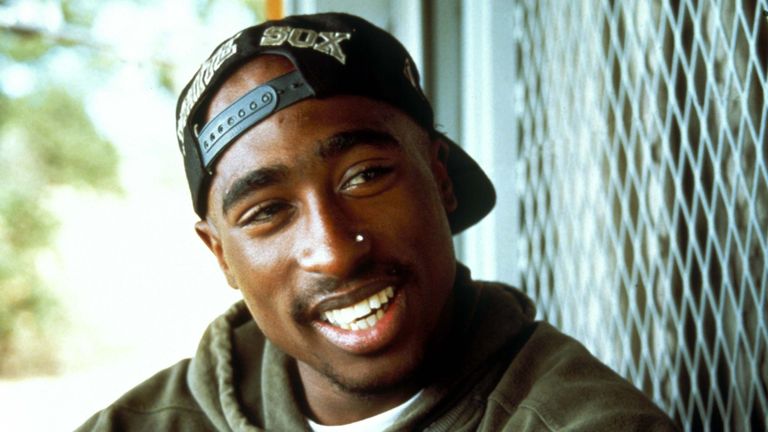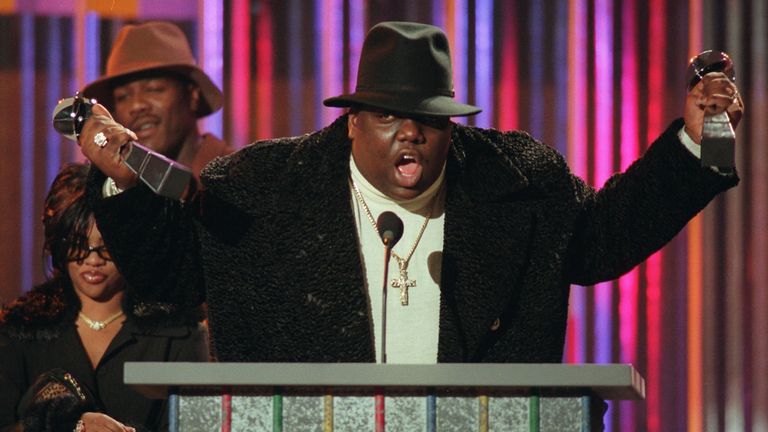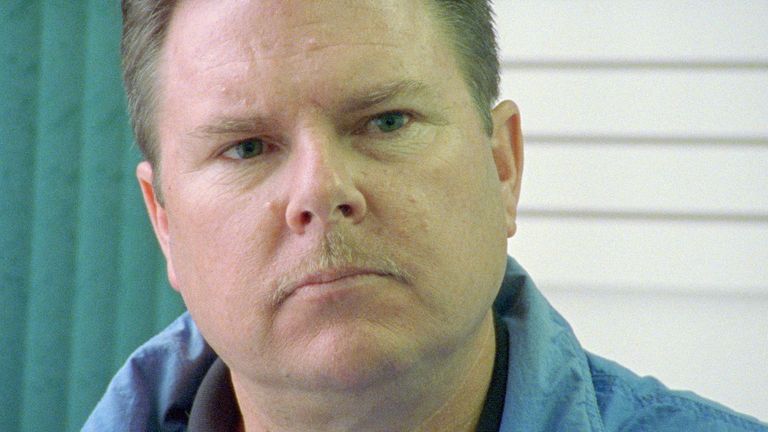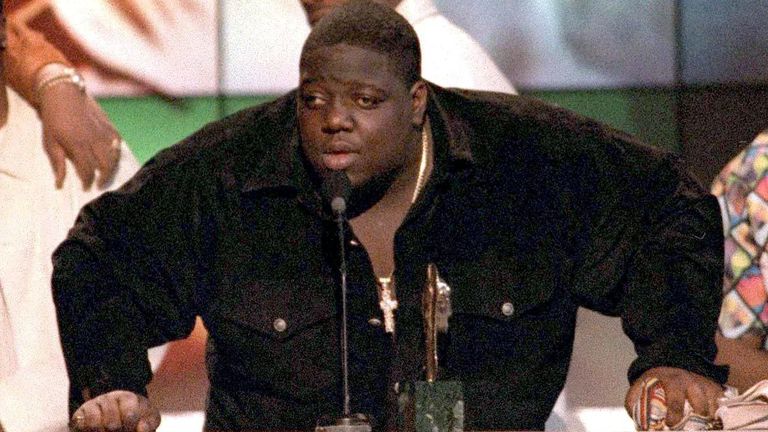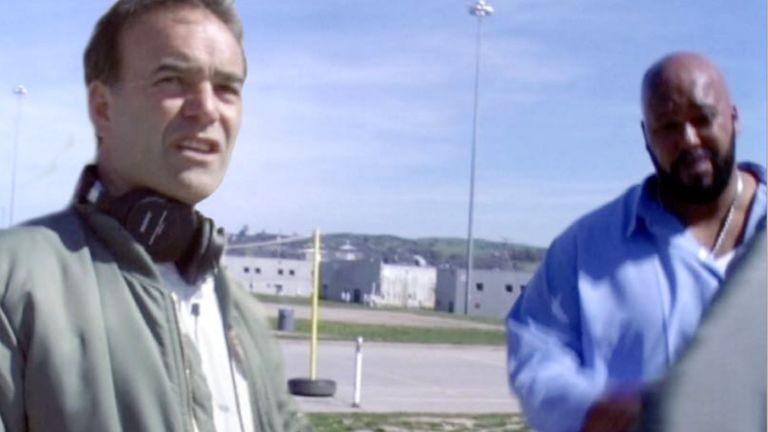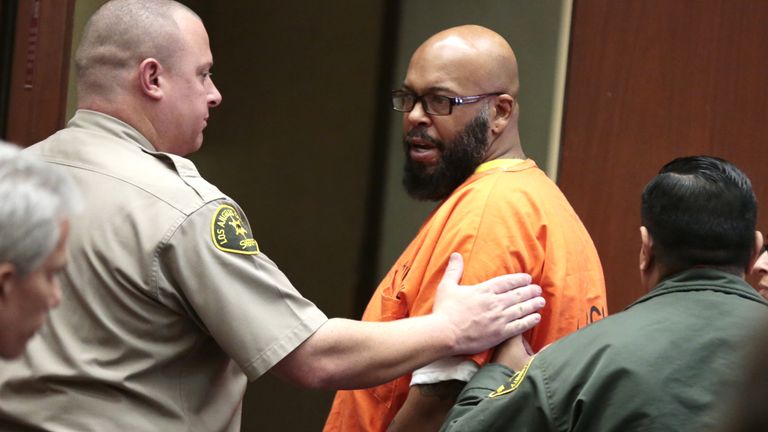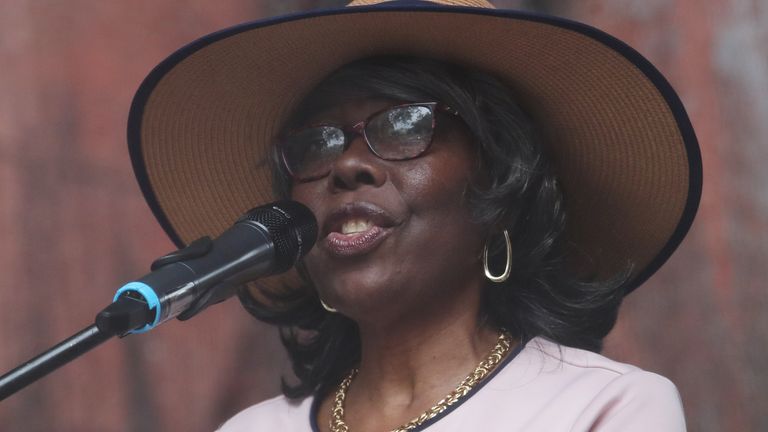“I didn’t want to do interviews for years. It was dangerous to know anything.”
After more than two decades, Leila Steinberg, former mentor and manager of Tupac Shakur, is one of several people featured in a new documentary who have now spoken out about the events surrounding the rapper’s murder in September 1996, and the killing of his one-time friend and contemporary Christopher Wallace, The Notorious BIG, six months later.
Two of the world’s greatest hip-hop talents, their murders have never been officially solved and speculation and theories about who pulled the triggers – and who was pulling the strings – rumble on. A search for information can take you down a rabbit hole of hundreds of reports and accounts gathered over 25 years.
It is a complex story of rivalry, gang culture and alleged police corruption. But many accounts of the time seem to come back to one man: Suge Knight, the co-founder of the infamous West Coast rap label Death Row, and rival of Sean “Puffy” Combs and his East Coast label, Bad Boy.
In September 2018, three years after running over and killing an associate in Compton, Los Angeles, Knight was jailed for manslaughter for 28 years. It is his imprisonment, says filmmaker Nick Broomfield, whose 2002 documentary Biggie & Tupac led to now retired FBI agent Phil Carson investigating Wallace’s murder, that was a turning point; with Knight’s power diminished, those who once worked for him and knew him felt freer to talk.
Steinberg is one of several people featured in Broomfield’s follow-up, Last Man Standing, which sees the director revisiting the story almost 20 years later. The documentary paints a picture of Death Row as a workplace entrenched in violence and misogyny, and features new testimonies supporting the theory that Knight commissioned the hit on Biggie – with “dirty cops” from the Los Angeles Police Department (LAPD) allegedly involved.
These are not new accusations; claims about Knight and the alleged involvement of corrupt police were made years ago by LAPD officer Russell Poole, a leading investigator in the Biggie case who was “vilified” by the force, says Broomfield. Poole, who featured in the first documentary, retired early and went on to continue his investigations privately, the case consuming his life; he died after suffering an aneurysm in 2015, while discussing the Tupac and Biggie murders at the Los Angeles County Sheriff’s Department.
The LAPD told Sky News it did not want to comment on the claims and the documentary, but has previously denied the allegations. A legal representative for Knight did not respond to Sky News’ request for comment.
Investigating Russell Poole’s theory
Broomfield says he wanted to return to the story because he always believed Poole was right – and with Knight in prison, he felt more confident of finding evidence to try to prove it.
“I kept in touch with Russell Poole a bit,” he tells Sky News. “Over the 20 years, there were certain developments… Suge Knight went to prison and a lot of people were prepared to come forward and say things that they were never going to say before.”
In 2006, amid a wrongful death lawsuit filed by Wallace’s family, which was eventually dismissed, the LAPD reopened the Biggie case, with retired detective Greg Kading concluding that Knight had commissioned a gang member called Wardell “Poochie” Fouse to carry out the shooting. By this point, Kading’s suspect could not be charged; Poochie was dead, gunned down while riding a motorbike in 2003.
The Poochie theory was based “on the flimsiest of evidence, and it was obviously to dispel the Biggie Smalls lawsuit”, Broomfield alleges. “I felt angry at the way Russell Poole was treated and angry that people believed the Kading theory.
“So that’s kind of why I went into [the second documentary]. I was motivated by feeling pissed off about what had happened in the intervening years, that it still was not solved and that people were accepting a theory that was completely incorrect, that exonerated the LAPD.”
What happened on the nights of the two murders?
Tupac Shakur was fatally wounded in a shooting in Las Vegas, Nevada, on 7 September 1996, dying of his injuries six days later, aged 25. Earlier in the night he had watched a Mike Tyson fight at the MGM Grand with Knight and was involved in a fight involving Orlando “Baby Lane” Anderson, a member of the Southside Crips, in the lobby afterwards; Knight was affiliated with the rival Bloods gang.
In 2018, after revealing he had terminal cancer, former Southside Crips gang member and Anderson’s uncle, Duane Keith Davis, known as Keefe D, implied Anderson had pulled the trigger and said he was also in the car. Anderson, who had always been the prime suspect but was never charged, had died 20 years earlier, in another gang-related shooting in 1998. Keefe D has never been charged with any offence in connection to the star’s death.
Six months after Shakur’s murder, in the early hours of 9 March 1997, Wallace was killed in a drive-by shooting in Los Angeles, at the age of 24. The New York rapper had travelled to California to promote his upcoming second album, Life After Death, and to present at the Soul Train Music Awards.
With the two central stars in the highly publicised East Coast-West Coast rap feud both dead, reports following Wallace’s murder immediately started linking it to that of Shakur. Now, many believe it was Anderson who was the gunman who shot Shakur. “I think there’s no doubt,” says Broomfield.
But Wallace’s shooting was different, he says. “The hit on Biggie was done by a professional, [it was] incredibly well co-ordinated. They were two very different events. I think the car that Tupac was in had 15 bullets going into it, so it was just a normal gangbanger kind of shooting. The other one was very orchestrated – and that’s the one that involved the LAPD.”
The allegations against former LAPD officers
Last Man Standing looks into Poole’s allegation that Wallace’s murder was commissioned by Knight with the help of corrupt LAPD officers who were moonlighting at Death Row. Broomfield’s film includes interviews with witnesses who claim they saw officers present on the night of Wallace’s murder, and who also claim critical information was deliberately withheld and concealed by the force. Steinberg is among them.
“Really it doesn’t matter who pulled the trigger – although I wouldn’t agree with [Kading’s theory] – but what I would say is, any gang member that wants to shoot or kill Biggie could have only done so with police involvement and support,” she says in the film. “You don’t have an event that’s a party after the Soul Train awards, especially in LA and there’s that many black people, and you think the police aren’t everywhere? They’re everywhere, doesn’t work that way,” she says. “There has to be compliance. They were complicit in everything that happened that had to do with Death Row.”
Carson, who retired from the FBI in 2017 after more than 20 years’ service, backs this argument. “You’ve got so many celebrities, so many pro athletes, so many musicians, artists, everything like that, that you are going to have a police presence,” he tells Sky News in a separate interview. “Not only in uniform, to deter people from doing anything crazy, but you’re going to have a lot of policemen in suits, basically executive protection for the individual talent. And they were able to orchestrate to make sure that none of that was around.”
Carson also says he was prevented from testifying at the Wallace family’s lawsuit trial but that the evidence he gathered is “undisputed”. His FBI bosses were behind him, he says; it was the Assistant US Attorney’s office that would not take it further.
He says he had never heard of Biggie before he started working on the case. “Originally my goal is not to find out who killed Biggie,” he says. “My goal was to find out, is this a public corruption case? Is there a civil rights violation? Was there police officers involved in orchestrating and committing this murder? In my quest to try to get all those answers, of which I got 99 percent of them, that’s when the obstruction took place and the cover-up.”
“There is a lot of information corroborating the work of Russell Poole,” says Broomfield. Last Man Standing, he says, provides “conclusive evidence that the LAPD were involved and they’ve done everything possible to cover it up, to besmirch the careers of people who were coming up with evidence that they didn’t like”.
Suge Knight’s power
Broomfield interviewed Knight, now 56, for his first documentary. His impressions were that “he’s kind of a bully” who has “this persona that he was trying at that time to keep, the big cigar that he very carefully lit for the interview, that sort of thing”.
Working with producer Pam Brooks, who helped secure many of the interviewees who feature in Last Man Standing, Broomfield tried to speak to him again, but was unsuccessful.
Making this film was less intimidating than working on the first, he says. “I think time has moved on and Suge has lost power, so it’s definitely better than it was.”
“It’s his own people telling the truth about who he is,” says Brooks. “This is [his] lifestyle… I don’t think he has any leverage.”
“He’s lost all his money,” says Broomfield. “A lot of the Blood gang members, having seen the promise once of making quite a lot of money while Death Row Records was doing so well, all returned to Compton broke, half of them were dead, they’d lost relatives and friends. And they had no love left for Suge Knight. So they all had stories to tell that they wouldn’t have told before.”
Carson says Combs was the intended target, not Wallace. “Based on all the interviews, all the evidence, on the photos, everything, there was police involvement and Suge Knight financed a retaliation for people killing Tupac, and his intention… he had a major beef with Puffy.”
Some theories claim it was Wallace who had arranged the hit on Tupac. Carson says this was not part of his investigation, but it isn’t necessarily the case. “Suge, he ruled with an iron fist and he has an ego bigger than the Pacific Ocean. And when he saw his number one talent, his big cash cow, get killed in Vegas, that’s when he put things into motion.”
It didn’t matter, he says, whether Wallace was involved. It was about ego. “That’s been Suge’s biggest downfall. Ever since he became somebody with Death Row, his ego has always gotten in the way and there’s a long track record of that.”
Could the Biggie case be reinvestigated?
Carson now presents a podcast on his investigation, alongside journalist Don Sikorski, called The Dossier. He says there is a lot at stake. “I knew at some point when I retired that… I didn’t know what platform, but I knew one day that I was going to try to set the record straight,” he says.
“If somebody were to come in that didn’t have any knowledge or any background of all the bulls*** that’s been put out there by other people on these false narratives, and they were to just look at the facts and look at the evidence, I firmly believe that this case would get reopened and they would solve this because it’s all right there. [But] the people that were involved in obstructing it and covering it up, those people wield a lot of power.”
Sikorski, who was an executive producer on the 2018 film City Of Lies, about Poole’s initial investigation and the alleged cover-up, says there are “powerful people” involved, but that he hopes the renewed interest in the story will help “increase the microscope” on the case.
Last Man Standing “crosses the Ts and dots the Is” of the story, says Broomfield. “The first film I made was as much a portrait of the environment and these incredible characters as anything else. This is much more a film about how it was possible for this to happen.
“How is it possible that this incredibly powerful record company is basically run by a gang? How is it possible that these incredible musicians, geniuses of that time period, both get killed? What were the forces that produced this? What was going on in their heads?
“It was kind of like this make-believe world that they had created that suddenly became real and ate them up.”
The filmmaker says he hopes what he says is new evidence shown in the film could lead to renewed interest in trying to finally solve the case.
“I think in this particular climate, where a lot of police forces are coming under heavy scrutiny, investigation, it would be a clever thing for the LAPD to come clean about this massive killing, which is so representative of the bad old LAPD, which was so corrupt, and just come clean about it and finally resolve this case.
“They’ve managed to cover it up for over 20 years now.”
Last Man Standing is in cinemas on 30 June followed by a special Q&A with Nick Broomfield, and on general release in select cinemas from 2 July

